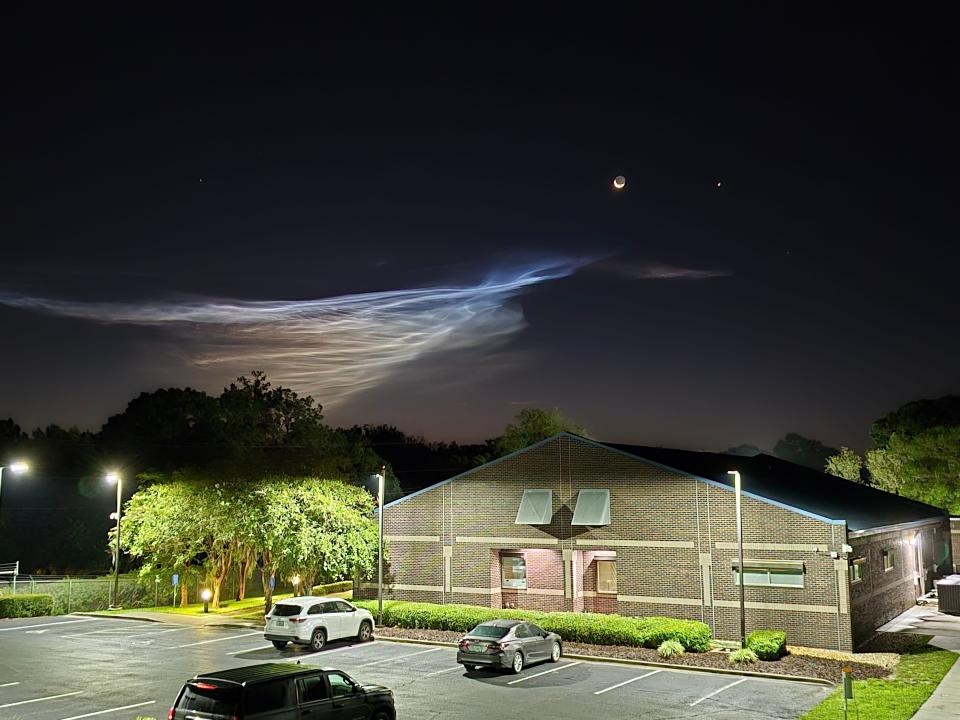SpaceX launch brings amazing views of 'noctilucent' clouds from Tallahassee to SW Florida
If you were up early this morning, you may have been privy to quite the celestial show, but it wasn't a repeat of the northern lights.
A SpaceX launch lit up the sky not only over Cape Canaveral, but also meant a view of noctilucent clouds from as far as Tampa and Southwest Florida.
The SpaceX Falcon 9 launched Wednesday at 4:55 a.m. with the latest batch of Starlink satellites.
And then the amazing thing happened.
Just over eight minutes into the flight, the first stage Falcon 9 booster made a visible, controlled landing on the A Shortfall of Gravitas droneship out on the Atlantic Ocean.
The landing trail, which is rarely seen from droneship landings, was illuminated by sunlight just under the horizon for over an hour — leaving a colorful area of sky next to a crescent moon and Jupiter.
Those "noctilucent clouds" were visible for quite a distance and lucky early-risers took to social media to share their photos.
When is the next Florida rocket launch? Is there a launch today? Upcoming SpaceX, NASA, ULA rocket launch schedule in Florida
But first, an explanation:
What are noctilucent clouds?
Noctilucent, or night-shining, clouds occur about 50 miles above the earth, much higher than typical clouds, according to the National Weather Service.
They are sometimes referred to as polar mesospheric clouds.
For noctilucent clouds to form they require water vapor, dust and very low temperatures, according to the U.K. Met Office.
During a rocket launch, water vapor is released into the atmosphere.
First observed in 1885 following the eruption of Krakatoa, noctilucent clouds are thought to be increasing in frequency, brightness, and becoming visible at lower latitudes as a result of human activity and climate change.
SpaceX launch amazes viewers, who take to social media to share photos, video

Treated to a colorful noctilucent cloud from this morning’s rocket launch 🚀 pic.twitter.com/6epct0Utis
— Jason Dunning (@JasonDunning) July 3, 2024
Imagine this sky on the beach at 5am - the noctilucent cloud of Starlink 8-9 with the Moon before sunrise Ormond Beach, FL this morning. @amhq @weatherchannel @StephanieAbrams #weather #sky #launch pic.twitter.com/O7QRJr3z2D
— Greg Diesel Walck (@GregDieselPhoto) July 3, 2024
Everyone seeing beautiful noctilucent clouds from the #SpaceX launch this morning had me wishing we weren't so cloudy in Tallahassee. This one below is from a Starlink launch last January viewed from Tallahassee. Even got a time lapse of it. pic.twitter.com/5k0yXgEhbz
— Wright Dobbs (@WrightDobbs) July 3, 2024
Starlink 8-9 noctilucent rocket cloud as it reached high altitudes before sunrise this morning 5:15am Ormond by the Sea, FL video to follow. @JenCarfagno @weatherchannel @elonmusk #weather #space #launch pic.twitter.com/VSkpw2N1Ga
— Greg Diesel Walck (@GregDieselPhoto) July 3, 2024
Noctilucent clouds alert! 🚨 SpaceX launched another bath of Starlink satellites this morning creating this effect. Sun shines on the extremely high clouds to give it this ghostly look. Cool, huh? pic.twitter.com/BcMCaFGubQ
— Leigh Spann (@WFLALeigh) July 3, 2024
Rare noctilucent clouds appear in Southwest Florida after SpaceX launch https://t.co/iISqQOLPVj
— WINK News (@winknews) July 3, 2024
SPECTACULAR! @SpaceX Falcon 9 launch just before 5am has created a noctilucent cloud from its exhaust trail catching the first morning solar rays. This area of smoke is MILES above normal clouds, which is how it can reflect sunshine even though it's still dark out. pic.twitter.com/eFv9OvoJXs
— Brooks Garner (@BrooksWeather) July 3, 2024
NOCTILUCENT CLOUDS!🤩🌌
After a #SpaceX launch this morning, #noctilucent clouds were visible from SWFL!
These very rare clouds made of ice crystals form in the Mesosphere and shine in the night sky as they are reflecting sunlight due to their high altitude. #flwx @StormHour pic.twitter.com/Xer72bq4sk— Juliana Mejia (@julianamwx) July 3, 2024
Contributor: Brooke Edwards, Florida Today
This article originally appeared on Treasure Coast Newspapers: Northern lights? It's SpaceX Florida launch's noctilucent clouds

